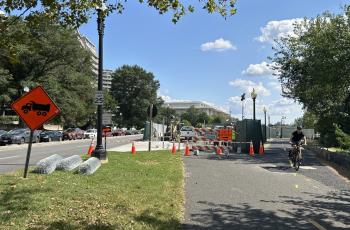Building Water Quality and Coronavirus: Flushing Guidance for Periods of Low or No Use
- The Environmental Science, Policy & Research Institute (ESPRI) and AH Environmental Consultants, Inc. (AH) developed this brief guidance material to help those who are responsible for maintaining building water systems.
- Additionally, the U.S. Centers for Disease Control and Prevention (CDC) has issued guidance to ensure the safety of building water systems and end-use devices after a prolonged shutdown.
In DC Water’s distribution system, water continuously flows through the water mains. However, water flow in commercial building pipes is generally slower and dependent on water usage. Minimal or no water usage can affect water quality. Learn more by reading our Improving Water Quality in Commercial Buildings Brochure.
Tips to Ensure Water Quality in Commercial Buildings
Flushing
Flush building water systems after periods of minimal or no water usage. Commercial buildings are often vacant during weekends and holidays and experience periods of minimal or no water usage. This may cause a reduction in disinfection protection which can lead to increased bacterial growth in building pipes. Locate the taps on each floor that are furthest from the floor's water service riser and flush the cold water taps for 10 minutes. Flush each fountain for one minute or install fountains with automatic flushing devices.
Water Filters
Routinely change water filters. Water filters that are not routinely changed can accumulate impurities and promote bacterial growth. Replace water fountain filters according to the manufacturer's instructions.
Aerators
Routinely clean faucet aerators. Particles can collect in the aerator screen located at the tip of faucets. Aerators should be replaced annually.
Plumbing
Install lead-free plumbing fixtures to help minimize lead from entering the building's drinking water system. Install fixtures and fittings that contain 0.25 percent lead or less.
Water Usage
Monitor water usage. Monitoring water usage can assist building owners in identifying plumbing leaks.
High Usage Notification Alerts (HUNA) notify customers when a building's water usage is higher than normal. Building owners can sign up multiple contacts to receive alerts via phone, email and text. Sign up for HUNA alerts online or call 202-354-3600.
Install water efficient fixtures labeled as"'WaterSense" to conserve water and reduce water bills.
Backflow prevention
Annually inspect and test backflow prevention assemblies. Backflow prevention assemblies prevent the reverse flow of water from the building into the public water system. Certified testers are required to annually inspect backflow prevention assemblies and submit reports to the DC Water Cross Connection Program. For more information about commercial buildings or backflow prevention, see Cross-Connections or contact the Drinking Water Division at 202-612-3440.


